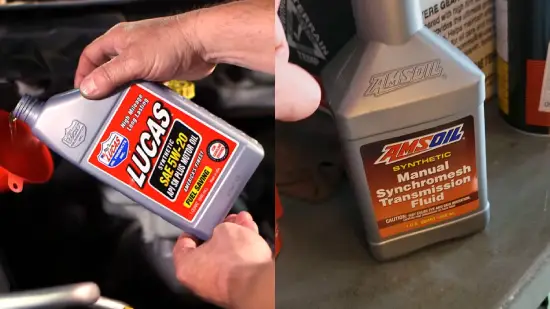Physical Address
304 North Cardinal St.
Dorchester Center, MA 02124
Physical Address
304 North Cardinal St.
Dorchester Center, MA 02124

Gear oil plays a significant role in the performance and reliability of your vehicle. Among the various options in the market, Lucas Oil and Amsoil gear oils have gained recognition for their unique features and benefits.
Lucas Oil is primarily petroleum-based, offering a cost-effective option that is increasingly recognized for its performance. Conversely, Amsoil is renowned for being fully synthetic, with superior shear strength and exceptional oxidation resistance.
Here, we will look at the 9 key differences between Lucas and Amsoil gear oil to help you determine which product is best suited for your car. These differences span a range of factors, from composition and synthetic base to pricing.

When comparing Lucas and Amsoil gear oils for vehicles, it’s important to consider several key points.
You can easily distinguish the differences between Lucas and Amsoil gear oil for your vehicles based on their composition and synthetic base.
Lucas Oil primarily comprises 100% pure petroleum, which gives it a traditional oil base. On the other hand, Amsoil is known for its fully synthetic composition. This means that Amsoil is formulated using advanced synthetic materials rather than being derived from petroleum.
Amsoil stands out because of its superior shear strength, which allows it to maintain its viscosity and protective properties even under high-stress conditions. This is crucial for vehicles subjected to demanding conditions where the integrity of the gear oil is vital.
In contrast, Lucas Oil, being petroleum-based, doesn’t offer the same level of shear strength as Amsoil. This means that it may not be as effective in preserving its consistency and protecting the gears under extreme conditions.
Oxidation occurs when the oil reacts with oxygen, forming harmful sludge and breaking the oil’s quality. Amsoil’s formulation is designed to withstand these effects, ensuring the oil remains in optimal condition over time.
On the other hand, Lucas Oil doesn’t provide the same level of oxidation resistance as Amsoil. This means that Lucas Oil may be more susceptible to the negative effects of oxidation, potentially leading to sludge formation and a decrease in oil performance.
When comparing Lucas and Amsoil gear oil for vehicles, their differences in freeze protection become apparent.
Amsoil stands out in this aspect, specifically designed to resist freezing and maintain its effectiveness even in sub-zero temperatures. This is particularly important in cold climates or during harsh winters, where freezing temperatures can compromise gear lubrication.
As a result of Amsoil’s ability to withstand extreme cold, your gears will function smoothly and efficiently, thereby reducing the risk of damage.
On the other hand, Lucas oil doesn’t have the same level of cold-weather performance, making it less suitable for use in extremely low temperatures. But it does provide a decent level of protection for regular temperatures and is affordable.
For fuel efficiency, Amsoil is often the preferred choice due to its lubrication properties and synthetic composition. Amsoil’s ability to reduce friction and improve engine efficiency can result in better gas mileage.
However, while Lucas Oil focuses on providing excellent protection and reliability, its impact on fuel efficiency may not be as significant. Lucas Oil may not offer the same level of friction reduction as Amsoil, which could affect fuel economy.
Therefore, if you prioritize fuel economy and better gas mileage, Amsoil may be the better option for your vehicle.
Amsoil, being a synthetic oil, is generally considered more environmentally friendly compared to Lucas Oil. Synthetic oils are designed to resist breakdown, which can reduce oil waste and the need for frequent oil changes. This means less oil is being disposed of, resulting in a lower ecological impact.
On the other hand, Lucas Oil may have other appealing qualities, but it’s crucial to consider its environmental impact as well. This brand may not be as ecologically friendly due to its lower resistance to breakdown, which could leave more oil waste in the environment.

In order to ensure optimal performance and protection for your vehicle’s gears, you should know the difference between Lucas and Amsoil gear oils.
Amsoil’s long-lasting properties allow for extended oil change intervals of up to 25,000 miles. This means fewer maintenance requirements and reduced downtime for your vehicle.
On the other hand, Lucas Oil users may prefer shorter change intervals, typically every 5,000 miles, to maintain consistent gear protection. For full synthetic gear oils from Lucas, changing the oil every 7,500 to 10,000 miles is recommended.
These shorter intervals ensure that the gear oil maintains its effectiveness and provides reliable gear protection.
Amsoil has been producing synthetic oils since 1969. With over 50 years of experience, Amsoil has built a strong reputation for providing high-quality synthetic oils that meet the needs of various vehicles.
Their long history in the industry demonstrates their commitment to excellence and their ability to adapt to changing technologies and demands.
In contrast, Lucas Oil entered the synthetic oil market in 1989, gaining recognition for its full synthetic offerings. While Lucas Oil has made a name for itself in the industry, some users may trust Amsoil’s established reputation and track record of producing reliable gear oils over Lucas Oil’s short history.
When considering the price point of Lucas and Amsoil gear oil for vehicles, you’ll find that Lucas Oil offers a more cost-effective option than Amsoil. While both brands are known for their quality and performance benefits, Lucas Oil provides a more affordable solution for those on a budget.
On the other hand, Amsoil is recognized for its high-quality synthetic composition, which often comes with a higher price tag. It’s important to note that the cost difference between the two brands doesn’t necessarily reflect a difference in performance or effectiveness.
| Aspect | Lucas Oil | Amsoil |
| Composition | 100% pure petroleum | Fully synthetic |
| Shear Strength | Lower | Superior |
| Oxidation Resistance | Less resistant | Highly resistant |
| Freeze Protection | Less effective in cold | Effective in low temps |
| Price | Generally more affordable | Higher price point |
| Origin and Reputation | Relatively recent | Established since 1970s |
| Availability | Widely available locally | Variable by location |
AMSOIL’s popularity stems from its superior performance and durability in protecting vehicle gears. Its synthetic motor oil is formulated with naturally shear-resistant base oils and shear-stable viscosity improvers, enabling it to withstand extreme heat and shearing forces.
This advanced formulation not only exceeds industry standards but also outperforms competing brands, making it a top choice among vehicle owners. In fact, AMSOIL’s ability to resist viscosity breakdown is 46% better than Mobil 1, further solidifying its reputation for exceptional performance.
Compared to other brands, AMSOIL gear oil may seem more expensive, but the added value and superior performance make it worth the investment.
With high-quality base oils and advanced additives, AMSOIL gear oil delivers exceptional performance and protection for your vehicle’s gear. Additionally, AMSOIL gear oil is engineered to have a long-lasting formula, allowing for extended drain intervals and reducing the frequency of oil changes.
Lucas gear oil is well-suited for various vehicle applications, providing excellent lubrication and protection for gears. It’s specifically designed for heavy-duty or high-performance vehicles, where other gear lubricants may not be sufficient.
The use of Lucas gear oil ensures less gear rattle and whine, as well as longer bearing and gear life due to its superior lubricating properties. This gear oil is formulated to withstand extreme pressure and high temperatures, making it suitable for demanding conditions.

If you’re wondering when to use it, Lucas Oil is recommended for heavy-duty or high-performance vehicles that require superior gear lubrication and protection. This oil is specifically formulated to handle the demands of these types of vehicles, providing excellent lubrication and reducing wear and tear on the gears.
It’s particularly beneficial for vehicles that experience high temperatures, heavy loads, or extreme conditions. Lucas Oil can be used in both manual and automatic transmissions, as well as in differentials and transfer cases.
After delving into the differences between Lucas and AMSOIL gear oil for vehicles, AMSOIL has gained popularity for its high performance and reliability. However, its high price tag may deter some potential buyers.
On the other hand, Lucas gear oil is known for its ability to improve performance and functionality, especially in older vehicles. With its roots in petroleum-based oils, it offers a cost-effective alternative with a growing reputation for performance. Whatever gear oil you choose, the priority remains the same: maintaining a vehicle’s engine’s health and longevity while ensuring optimal performance.
Last update on 2026-02-14 / Affiliate links / Images from Amazon Product Advertising API